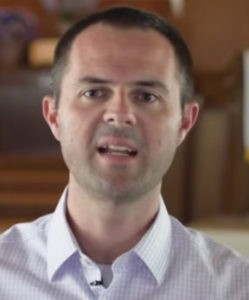If they haven’t done so already, American churches should brace themselves for the acceleration of social, political and religious trends already ravaging faith institutions, researcher and author Ryan Burge warned.
“I think we’re in for a serious downsizing of American religion — wholesale denominational closures and lots and lots of churches shutting their doors in 20 or 30 years,” he said during a Sept. 12 webinar hosted by the Baptist Studies Center at Abilene Christian University. “And it’s all going to be gone before we know it.”
The virtual event kicked off the center’s 2022-23 “Where Do We go From Here” webinar series, which is designed to provide guidance to ministers and congregations navigating a fractured and post-pandemic society already reeling from the decline of organized religion.

Ryan Burge
Burge, a political scientist at Eastern Illinois University and author of The Nones: Where They Came From, Who They Are, and Where They are Going, is a leading researcher in the rise of religiously unaffiliated Americans and their influence on the church. He is also the pastor of an American Baptist congregation.
Both his own and others’ research, in addition to the dwindling attendance at his own congregation, make clear that the continued decline of faith groups is a matter of time and math, Burge said.
“Younger people are much less religious than older people, which means the future looks completely different than the past. The future, if you’re a church, is not looking rosy for you. Objectively and empirically, that’s the fact.”
Most often, that decline won’t involve the histrionic departures of angry or disillusioned members, he said. “It’s not a big, dramatic ‘We’re leaving’… It’s just every single day the percentages shift by microscopic amounts — .01%, then .02% and over the course of five years that becomes 2% or 3%, and now we’re seeing wholesale changes.”
Burge said 45% of Generation Z, currently ages 10 to 25, say they have no religious affiliation, while 37% identify as either Protestant or Catholic. That’s compared to only 18% of Baby Boomers who self-identify as nones.
“So, there are way more nones in Generation Z than there are Christians,” Burge said. “People think the changes are occurring because people leave church. … The reality is it’s not that. It’s the generational replacement. That’s how things change over time.”
“This is probably the biggest cultural shift in the past 100 years besides the fact Americans are becoming less and less white.”
The change already has been astonishing, Burge said. “In 1972, 5% of Americans were nones, so one in 20 Americans were nones. By 1990 that had gone to 7%. But from 1990 onward, it’s gone from 7% to probably closer to 30% now. This is probably the biggest cultural shift in the past 100 years besides the fact Americans are becoming less and less white.”
And the nones have evolved into a much more complex category than often meets the eye, said Burge, who identified one group as “secular people” and the other as “nothing in particular.”
“Secular people are atheists and agnostics,” he explained. “They have abandoned the religious worldview and embrace the secular, the humanist or scientific worldview.”
Then there are the “nothing in particulars,” he said. “That’s what surveys call them. They have thrown off the religious identity, but they have not embraced another identity. So, they’re not secular and they’re not religious.”
Three in five nones fall in the latter group, Burge added. “So, most nones are actually non-religious and non-secular.”
As daunting as the statistics and trends are, they also contain useful information, including identifying which subsets churches should reach out to, Burge said. “Stop trying to convert atheists. It’s just a waste of time. … It’s not a good use of time, pastors debating atheists.”
Instead, the goal should be to work with the “nothing in particular” group, which includes one-third of college students, Burge said. “The problem is these people are hard to spot because they fall through the cracks. They’re not the ones yelling that God doesn’t exist. They don’t really believe in anything, and they feel that society has left them behind.”
And these Americans are falling behind, Burge said. While close to 50% of atheists have college degrees and 60% earn more than $100,000 annually, only 25% of “nothing in particulars” have earned college degrees and only 40% earn $100,000 a year, Burge said.
“They’re left behind, left out, lost, isolated and they’re growing.”
“They’re left behind, left out, lost, isolated and they’re growing. Over 20% of Americans now are ‘nothing in particular,’ yet when a lot of Christians hear the word ‘none’ they automatically pivot toward atheists and agnostics when they only represent a very small sliver of what the nones are.”
The downward economic and social drift of Americans who identify as “nothing in particular” make them wide open to the message of hope and fellowship that churches can — and should — be offering, Burge said.
“They’re hard to find, but they’re the ones most willing to hear the message and they’re the ones who could benefit the most from being part of a religious community. So, churches should focus on reaching out to that community.”
The trends affecting churches should inspire them to enhance their influence on local communities, he said. “Don’t focus on growth or on declining numbers, but focus on mission. You can only do so much in the situation you’re in to be the best church you can be.”
That was a lesson Burge said he had to implement as pastor of First Baptist Church of Mount Vernon, Ill., after someone asked if anyone outside the congregation would miss the church if it closed.
After answering no, the church launched a brown-bag ministry that provides weekend meals to public schoolchildren.
“So now I know if our church closes down, there are going to be 225 kids in public schools every single week who are not going to be fed,” he explained. “And that means we matter. We’re building the kingdom of God in our community by feeding hungry kids.”
The bottom line is not becoming blinded or immobilized by the rise of the nones and the decline of religion in America, Burge advised.
“All you can do is try to make your community a better place. If your church becomes twice as large in a year, that’s great. And if it becomes half as large, that’s fine too. It’s not your job to grow. It’s your job to be faithful to the mission of your church. Run that race as long as you can and as best that you can, and let God figure everything else out.”
Related articles:
In BNG webinar, Ryan Burge details the double threat to denominational churches in America


